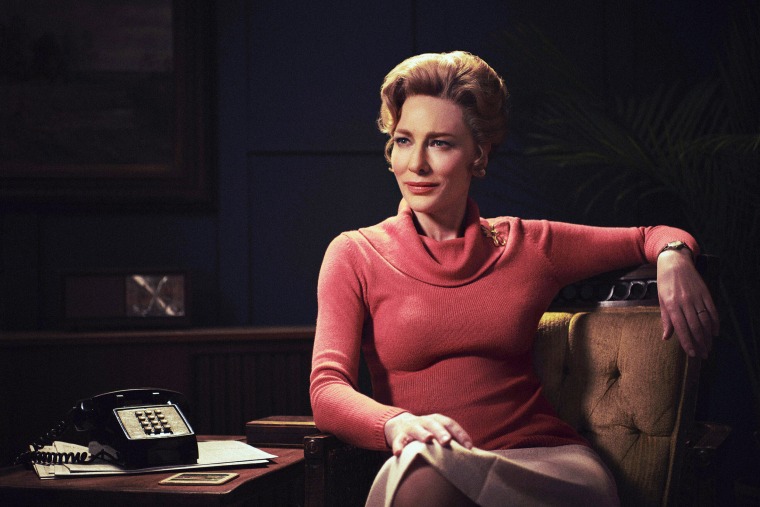Anti-feminist campaigner — and the reason women's access to equal rights under the law isn't listed in the Constitution — Phyllis Schlafly should still be a household name in America ... but not for the reasons you think. Though her campaign against the Equal Rights Amendment was ultimately successful, her fight for women's continued relegation to second-class legal status mostly wasn't, leaving her with a minimal legacy — except for how influential her use of traditional modes of femininity to make her power feel less threatening remains in conservative circles.
"Mrs. America," FX on Hulu's nine-episode series about the fight over the ERA, then accomplishes the seemingly impossible: It humanizes Schlafly, the perfectly coiffed housewife-in-name-only whose longtime political work outside the home to bring down the women's "libbers" is still reflected in the actions of white women who supported and voted for Donald Trump.
I have but the barest recollection of the real Schlafly from the '80s: I remember her on Phil Donahue's eponymous talk show — who didn't love Donahue? — but mostly what comes to mind is the satirization of her in Berkeley Breathed's "Bloom County," where jokes about her being President Ronald Reagan's "little dumplin'" and running a organization called Ladies Against Women went way, way over my head.
You can see where my loyalties lie. And yet, though I watched "Mrs. America" for the look at the feminist movement, it was to the character of Schlafly that my eyes were increasingly drawn.
Schlafly, played with a steely brilliance by Cate Blanchett, founded the ultimately incredibly successful grassroots organization STOP ERA in 1972, which she renamed the Eagle Forum (the name under which it operates today) in 1975.
The filmmakers portray the infighting and concessions she — and her enemies, the feminists — made in her push for power, which still feel deeply relevant. For example, the Catholic Schlafly evinces a certain amount of discomfort in joining forces with white evangelicals against the ERA, who push their pro-life agenda and barely hide their affiliation with the anti-Catholic Ku Klux Klan. (In real life, Schlafly fought a more inclusionary Republican Party platform at the 1960 convention, pushing to exclude "an anti-segregation and anti-discrimination plank in the party's platform.")
Furthermore, the real-life Schlafly's homophobic compatriots argued — with her support — that the ERA would lead to — gasp — "same sex" bathrooms. The writers of the show then also suggest Schlafly knew her son, John Schlafly (who was outed in 1992), was gay, even though she spouted such homophobic vitriol in public and in the confessional, where she bemoaned having a "pervert" for a son and wondered why such a thing should happen to her. (Whether she really knew at the time remains up for debate.)
And watching Schlafly simply invent legal cases and oblique arguments on the fly during debates over the ERA feels awfully familiar right now, too.
As part of her work to defeat efforts to enshrine women's equality under the law in the Constitution, she helped bring about about the complete infiltration of the Republican Party by the white evangelical movement, an act that's been catastrophic on every level for the American government — right down to the insistence of megachurches on staying open in the face of COVID-19. (The Eagle Forum's technique of inundating politicians with letters and calls as a form of protest has also been adapted by organizations like One Million Moms, which wages wars of attrition against companies like Hallmark to stop "anti-Christian" messaging in media.)
But ultimately, because her biggest success in life was destroying a constitutional amendment the effects of which have since been incrementally but broadly accomplished by the movement she hated, she's reduced in the popular imagination to that caricature I remember. However, just because the work of Gloria Steinem and her colleagues still reverberates so much more widely than Schlafly's, modern feminists can't rest on our laurels — especially with so many would-be Schlaflys waiting in the wings for the 2020 election.
And although "Mrs. America" is ardently feminist, it doesn't shy away from showing the movement's problems — which continue today. "Feminine Mystique" writer Betty Friedan, for instance, is shown opposing the inclusion of LGBTQ rights in the feminist agenda — echoing the current demand by a tiny number of cisgender women self-identifying as feminists that transgender women be excluded from feminist spaces.

In another episode, Steinem and Rep. Bella Abzug, D-N.Y., decide that supporting Rep. Shirley Chisholm's campaign for Democratic presidential nomination in 1972 was too risky for both the overall feminist movement and the ability to win the presidency. They say they'd rather get a political win that advances their interests a little than take a revolutionary risk and fail — and their willingness to betray an African American compatriot for incremental gains also has reverberations among liberal women today.
So if you as a viewer think that the ins and outs of amassing delegates and political maneuvering can't be interesting, "Mrs. America" has news for you — and not just because the infighting and personal struggles of the characters are just as relevant and familiar. It might be time for all of us on lockdown to learn a little history, rather than be doomed to continue to repeat it.



